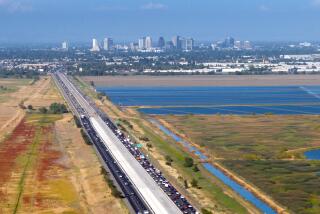Board Delays Vote on Toll Routes
The largest toll road authority in Orange County postponed a decision Thursday to combine the operations of the successful Foothill-Eastern tollway with the San Joaquin Hills turnpike, which is facing financial collapse by 2014 if no remedy is found.
Board members for the Transportation Corridor Agencies delayed their vote until Feb. 19 to give themselves time to better review the plan’s risks and study a new evaluation of the controversial proposal to save the San Joaquin Hills with a merger and $4-billion bond issue to refinance both highways.
In October, the Orange County Board of Supervisors hired First Southwest, a major financial consulting firm based in Dallas, to review the consolidation plan independently of the TCA’s team of private financial consultants.
Three supervisors sit on TCA boards that set policy for the agency’s 51-mile network of tollways.
Officials said First Southwest completed the report late Wednesday and conveyed it to the TCA on Thursday morning as the agency’s three boards of directors began to meet. The report, which has been deemed confidential, was not released to the public.
“I am still not ready to vote,” said TCA board member and county Supervisor Tom Wilson, who made the motion to postpone.
“There is information out there that we all should see.”
Wilson and several other board members also said they wanted a more detailed explanation from TCA staff of the risks associated with the $4-billion refinance plan, which, if approved, would be one of the largest municipal bond deals in Wall Street history.
In addition to about $3 billion in tax-exempt bonds sold to investors at fixed interest rates, the plan includes about $1 billion in so-called interest rate swaps with financial institutions, such as investment banks.
“I don’t understand the risks yet on the swap. We have not quantified that risk,” said TCA board member and county Supervisor Bill Campbell. “I don’t want to be back here in five years to refinance this thing again.”
Under the proposed swaps, the TCA would issue variable-rate bonds to investors that carry lower interest rates than fixed-rate bonds, but could rise or drop as interest rates change over time. The TCA would then negotiate a fixed rate below the market rate with financial institutions that would agree to pay the interest on the variable-rate bonds.
As a result, the TCA would obtain a fixed interest rate below the market rate, while the financial institutions would profit from the difference in interest between the variable-rate bonds and the fixed rate they negotiated with the TCA.
TCA financial analysts say the swap will result in lower interest and save the agency about $788 million in debt payments if the highways are merged and refinanced.
The risks, they say, include potential failures of the TCA or the financial institutions to make the interest payments they agreed to. They also said financial institutions could involuntarily terminate the deal and TCA would have to pay the variable-rate interest.
More to Read
Sign up for Essential California
The most important California stories and recommendations in your inbox every morning.
You may occasionally receive promotional content from the Los Angeles Times.











